- Home
- Peter S. Beagle
The Last Unicorn Page 2
The Last Unicorn Read online
Page 2
The long road hurried to nowhere and had no end. It ran through villages and small towns, flat country and mountains, stony barrens and meadows springing out of stones, but it belonged to none of these, and it never rested anywhere. It rushed the unicorn along, tugging at her feet like the tide, fretting at her, never letting her be quiet and listen to the air, as she was used to doing. Her eyes were always full of dust, and her mane was stiff and heavy with dirt.
Time had always passed her by in her forest, but now it was she who passed through time as she traveled. The colors of the trees changed, and the animals along the way grew heavy coats and lost them again; the clouds crept or hurried before the changing winds, and were pink and gold in the sun or livid with storm. Wherever she went, she searched for her people, but she found no trace of them, and in all the tongues she heard spoken along the road there was not even a word for them any more.
Early one morning, about to turn off the road to sleep, she saw a man hoeing in his garden. Knowing that she should hide, she stood still instead and watched him work, until he straightened and saw her. He was fat, and his cheeks jumped with every step he took. “Oh,” he said. “Oh, you’re beautiful.”
When he tugged off his belt, made a loop in it, and moved clumsily toward her, the unicorn was more pleased than frightened. The man knew what she was, and what he himself was for: to hoe turnips and pursue something that shone and could run faster than he could. She sidestepped his first lunge as lightly as though the wind of it had blown her out of his reach. “I have been hunted with bells and banners in my time,” she told him. “Men knew that the only way to hunt me was to make the chase so wondrous that I would come near to see it. And even so I was never once captured.”
“My foot must have slipped,” said the man. “Steady now, you pretty thing.”
“I’ve never really understood,” the unicorn mused as the man picked himself up, “what you dream of doing with me, once you’ve caught me.” The man leaped again, and she slipped away from him like rain. “I don’t think you know yourselves,” she said.
“Ah, steady, steady, easy now.” The man’s sweating face was striped with dirt, and he could hardly get his breath. “Pretty,” he gasped. “You pretty little mare.”
“Mare?” The unicorn trumpeted the word so shrilly that the man stopped pursuing her and clapped his hands to his ears. “Mare?” she demanded. “I, a horse? Is that what you take me for? Is that what you see?”
“Good horse,” the fat man panted. He leaned on the fence and wiped his face. “Curry you up, clean you off, you’ll be the prettiest old mare anywhere.” He reached out with the belt again. “Take you to the fair,” he said. “Come on, horse.”
“A horse,” the unicorn said. “That’s what you were trying to capture. A white mare with her mane full of burrs.” As the man approached her, she hooked her horn through the belt, jerked it out of his grasp, and hurled it across the road into a patch of daisies. “A horse, am I?” she snorted. “A horse, indeed!”
For a moment the man was very close to her, and her great eyes stared into his own, which were small and tired and amazed. Then she turned and fled up the road, running so swiftly that those who saw her exclaimed, “Now there’s a horse! There’s a real horse!” One old man said quietly to his wife, “That’s an Ayrab horse. I was on a ship with an Ayrab horse once.”
From that time the unicorn avoided towns, even at night, unless there was no way at all to go around them. Even so, there were a few men who gave chase, but always to a wandering white mare; never in the gay and reverent manner proper to the pursuit of a unicorn. They came with ropes and nets and baits of sugar lumps, and they whistled and called her Bess and Nellie. Sometimes she would slow down enough to let their horses catch her scent, and then watch as the beasts reared and wheeled and ran away with their terrified riders. The horses always knew her.
“How can it be?” she wondered. “I suppose I could understand it if men had simply forgotten unicorns, or if they had changed so that they hated all unicorns now and tried to kill them when they saw them. But not to see them at all, to look at them and see something else—what do they look like to one another, then? What do trees look like to them, or houses, or real horses, or their own children?”
Sometimes she thought if men no longer know what they are looking at, there may well be unicorns in the world yet, unknown and glad of it. But she knew beyond both hope and vanity that men had changed, and the world with them, because the unicorns were gone. Yet she went on along the hard road, although each day she wished a little more that she had never left her forest.
Then one afternoon the butterfly wobbled out of a breeze and lit on the tip of her horn. He was velvet all over, dark and dusty, with golden spots on his wings, and he was as thin as a flower petal. Dancing along her horn, he saluted her with his curling feelers. “I am a roving gambler. How do you do?”
The unicorn laughed for the first time in her travels. “Butterfly, what are you doing out on such a windy day?” she asked him. “You’ll take cold and die long before your time.”
“Death takes what man would keep,” said the butterfly, “and leaves what man would lose. Blow, wind, and crack your cheeks. I warm my hands before the fire of life and get four-way relief.” He glimmered like a scrap of owl-light on her horn.
“Do you know what I am, butterfly?” the unicorn asked hopefully, and he replied, “Excellent well, you’re a fishmonger. You’re my everything, you are my sunshine, you are old and gray and full of sleep, you’re my pickle-face, consumptive Mary Jane.” He paused, fluttering his wings against the wind, and added conversationally, “Your name is a golden bell hung in my heart. I would break my body to pieces to call you once by your name.”
“Say my name, then,” the unicorn begged him. “If you know my name, tell it to me.”
“Rumpelstiltskin,” the butterfly answered happily. “Gotcha! You don’t get no medal.” He jigged and twinkled on her horn, singing, “Won’t you come home, Bill Bailey, won’t you come home, where once he could not go. Buckle down, Winsocki, go and catch a falling star. Clay lies still, but blood’s a rover, so I should be called kill-devil all the parish over.” His eyes were gleaming scarlet in the glow of the unicorn’s horn.
She sighed and plodded on, both amused and disappointed. It serves you right, she told herself. You know better than to expect a butterfly to know your name. All they know are songs and poetry, and anything else they hear. They mean well, but they can’t keep things straight. And why should they? They die so soon.
The butterfly swaggered before her eyes, singing, “One, two, three o’lairy,” as he whirled; chanting, “Not, I’ll not, carrion comfort, look down that lonesome road. For, oh, what damned minutes tells he o’er who dotes, yet doubts. Hasten, Mirth, and bring with thee a host of furious fancies whereof I am commander, which will be on sale for three days only at bargain summer prices. I love you, I love you, oh, the horror, the horror, and aroint thee, witch, aroint thee, indeed and truly you’ve chosen a bad place to be lame in, willow, willow, willow.” His voice tinkled in the unicorn’s head like silver money falling.
He traveled with her for the rest of the waning day, but when the sun went down and the sky was full of rosy fish, he flew off her horn and hovered in the air before her. “I must take the A train,” he said politely. Against the clouds she could see that his velvet wings were ribbed with delicate black veins.
“Farewell,” she said. “I hope you hear many more songs”—which was the best way she could think of to say good-by to a butterfly. But instead of leaving her, he fluttered above her head, looking suddenly less dashing and a little nervous in the blue evening air. “Fly away,” she urged him. “It’s too cold for you to be out.” But the butterfly still dallied, humming to himself.
“They ride that horse you call the Macedonai,” he intoned absentmindedly, and then, very clearly, “Unicorn. Old French, unicorne. Latin, unicornis. Literally, one-horned: unus, one,
and cornu, a horn. A fabulous animal resembling a horse with one horn. Oh, I am a cook and a captain bold and the mate of the Nancy brig. Has anybody here seen Kelly?” He strutted joyously in the air, and the first fireflies blinked around him in wonder and grave doubt.
The unicorn was so startled and so happy to hear her name spoken at last that she overlooked the remark about the horse. “Oh, you do know me!” she cried, and the breath of her delight blew the butterfly twenty feet away. When he came scrambling back to her, she pleaded, “Butterfly, if you really know who I am, tell me if you have ever seen anyone like me, tell me which way I must go to find them. Where have they gone?”
“Butterfly, butterfly, where shall I hide?” he sang in the fading light. “The sweet and bitter fool will presently appear. Christ, that my love were in my arms, and I in my bed again.” He rested on the unicorn’s horn once more, and she could feel him trembling.
“Please,” she said. “All I want to know is that there are other unicorns somewhere in the world. Butterfly, tell me that there are still others like me, and I will believe you and go home to my forest. I have been away so long, and I said that I would come back soon.”
“Over the mountains of the moon,” the butterfly began, “down the Valley of the Shadow, ride, boldly ride.” Then he stopped suddenly and said in a strange voice, “No, no, listen, don’t listen to me, listen. You can find your people if you are brave. They passed down all the roads long ago, and the Red Bull ran close behind them and covered their footprints. Let nothing you dismay, but don’t be half-safe.” His wings brushed against the unicorn’s skin.
“The Red Bull?” she asked. “What is the Red Bull?”
The butterfly started to sing. “Follow me down. Follow me down. Follow me down. Follow me down.” But then he shook his head wildly and recited, “His firstling bull has majesty, and his horns are the horns of a wild ox. With them he shall push the peoples, all of them, to the ends of the earth. Listen, listen, listen quickly.”
“I am listening,” the unicorn cried. “Where are my people, and what is the Red Bull?”
But the butterfly swooped close to her ear, laughing. “I have nightmares about crawling around on the ground,” he sang. “The little dogs, Tray, Blanche, Sue, they bark at me, the little snakes, they hiss at me, the beggars are coming to town. Then at last come the clams.”
For a moment more he danced in the dusk before her; then he shivered away into the violet shadows by the roadside, chanting defiantly, “It’s you or me, moth! Hand to hand to hand to hand to hand…” The last the unicorn saw of him was a tiny skittering between the trees, and her eyes might have deceived her, for the night was full of wings now.
At least he did recognize me, she thought sadly. That means something. But she answered herself, No, that means nothing at all, except that somebody once made up a song about unicorns, or a poem. But the Red Bull. What could he have meant by that? Another song, I suppose.
She walked on slowly, and the night drew close about her. The sky was low and almost pure black, save for one spot of yellowing silver where the moon paced behind the thick clouds. The unicorn sang softly to herself, a song she had heard a young girl singing in her forest long ago.
Sparrows and cats will live in my shoe,
Sooner than I will live with you.
Fish will come walking out of the sea,
Sooner than you will come back to me.
She did not understand the words, but the song made her think longingly of her home. It seemed to her that she had heard autumn beginning to shake the beech trees the very moment that she stepped out into the road.
At last she lay down in the cold grass and fell asleep. Unicorns are the wariest of all wild things, but they sleep soundly when they sleep. All the same, if she had not been dreaming of home, she would surely have roused at the sound of wheels and jingling coming closer through the night, even though the wheels were muffled in rags and the little bells wrapped in wool. But she was very far away, farther than the soft bells could go, and she did not wake.
There were nine wagons, each draped in black, each drawn by a lean black horse, and each baring barred sides like teeth when the wind blew through the black hangings. The lead wagon was driven by a squat old woman, and it bore signs on its shrouded sides that said in big letters: MOMMY FORTUNA’S MIDNIGHT CARNIVAL. And below, in smaller print: Creatures of night, brought to light.
When the first wagon drew even with the place where the unicorn lay asleep, the old woman suddenly pulled her black horse to a stop. All the other wagons stopped too and waited silently as the old woman swung herself to the ground with an ugly grace. Gliding close to the unicorn, she peered down at her for a long time, and then said, “Well. Well, bless my old husk of a heart. And here I thought I’d seen the last of them.” Her voice left a flavor of honey and gunpowder on the air.
“If he knew,” she said and she showed pebbly teeth as she smiled. “But I don’t think I’ll tell him.” She looked back at the black wagons and snapped her fingers twice. The drivers of the second and third wagons got down and came toward her. One was short and dark and stony, like herself; the other was a tall, thin man with an air of resolute bewilderment. He wore an old black cloak, and his eyes were green.
“What do you see?” the old woman asked the short man. “Rukh, what do you see lying there?”
“Dead horse,” he answered. “No, not dead. Give it to the manticore, or the dragon.” His chuckle sounded like matches striking.
“You’re a fool,” Mommy Fortuna said to him. Then, to the other, “What about you, wizard, seer, thaumaturge? What do you see with your sorcerer’s sight?” She joined with the man Rukh in a ratchety roar of laughter, but it ended when she saw that the tall man was still staring at the unicorn. “Answer me, you juggler!” she snarled, but the tall man did not turn his head. The old woman turned it for him, reaching out a crablike hand to yank his chin around. His eyes fell before her yellow stare.
“A horse,” he muttered. “A white mare.”
Mommy Fortuna looked at him for a long time. “You’re a fool too, magician,” she snickered at last, “but a worse fool than Rukh, and a more dangerous one. He lies only out of greed, but you lie out of fear. Or could it be kindness?” The man said nothing, and Mommy Fortuna laughed by herself.
“All right,” she said. “It’s a white mare. I want her for the Carnival. The ninth cage is empty.”
“I’ll need rope,” Rukh said. He was about to turn away, but the old woman stopped him.
“The only rope that could hold her,” she told him, “would be the cord with which the old gods bound the Fenris-wolf. That one was made of fishes’ breath, bird spittle, a woman’s beard, the miaowing of a cat, the sinews of a bear, and one thing more. I remember—mountain roots. Having none of these elements, nor dwarfs to weave them for us, we’ll have to do the best we can with iron bars. I’ll put a sleep on her, thus,” and Mommy Fortuna’s hands knitted the night air while she grumbled a few unpleasant words in her throat. There was a smell of lightning about the unicorn when the old woman had finished her spell.
“Now cage her,” she said to the two men. “She’ll sleep till sunrise, whatever racket you make—unless, in your accustomed stupidity, you touch her with your hands. Take the ninth cage to pieces and build it around her, but beware! The hand that so much as brushes her mane turns instantly to the donkey’s hoof it deserves to be.” Again she gazed mockingly at the tall, thin man. “Your little tricks would be even harder for you than they already are, wizard,” she said, wheezing. “Get to work. There’s not much dark left.”
When she was well out of earshot, sliding back into the shadow of her wagon as though she had just come out to mark the hour, the man named Rukh spat and said curiously, “Now I wonder what’s worrying the old squid. What would it matter if we touched the beast?”
The magician answered him in a voice almost too soft to be heard. “The touch of a human hand would wake her out of th
e deepest sleep the devil himself could lay on her. And Mommy Fortuna’s no devil.”
“She’d like us to think so,” the dark man sneered. “Donkey hooves! Gahhh!” But he thrust his hands deep into his pockets. “Why would the spell be broken? It’s just an old white mare.”
But the magician was walking away toward the last of the black wagons. “Hurry,” he called over his shoulder. “It will be day soon.”
It took them the rest of the night to pull down the ninth cage, bars and floor and roof, and then to put it back together around the sleeping unicorn. Rukh was tugging at the door to make sure that it was securely locked, when the gray trees in the east boiled over and the unicorn opened her eyes. The two men slipped hurriedly away, but the tall magician looked back in time to see the unicorn rise to her feet and stare at the iron bars, her low head swaying like the head of an old white horse.
Chapter 2
The nine black wagons of the Midnight Carnival seemed smaller by daylight and not menacing at all, but flimsy and fragile as dead leaves. Their draperies were gone, and they were now adorned with sad black banners cut from blankets, and stubby black ribbons that twitched in the breeze. They were arranged strangely in a scrubby field: a pentacle of cages enclosing a triangle, and Mommy Fortuna’s wagon lumping in the center. This cage alone retained its black veil, concealing whatever it contained. Mommy Fortuna was nowhere to be seen.
The man named Rukh was leading a straggling crowd of country folk slowly from one cage to the next, commenting somberly on the beasts within. “This here’s the manticore. Man’s head, lion’s body, tail of a scorpion. Captured at midnight, eating werewolves to sweeten its breath. Creatures of night, brought to light. Here’s the dragon. Breathes fire now and then—usually at people who poke it, little boy. Its inside is an inferno, but its skin is so cold it burns. The dragon speaks seventeen languages badly, and is subject to gout. The satyr. Ladies keep back. A real troublemaker. Captured under curious circumstances revealed to gentlemen only, for a token fee after the show. Creatures of night.” Standing by the unicorn’s cage, which was one of the inner three, the tall magician watched the procession proceeding around the pentacle. “I shouldn’t be here,” he said to the unicorn. “The old woman warned me to stay away from you.” He chuckled pleasantly. “She has mocked me from the day I joined her, but I have made her nervous all that time.”

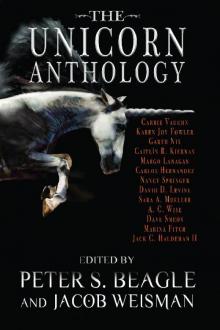 The Unicorn Anthology.indb
The Unicorn Anthology.indb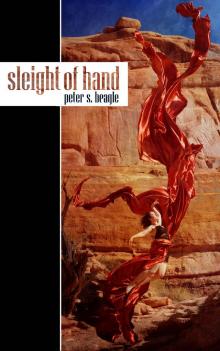 Sleight of Hand
Sleight of Hand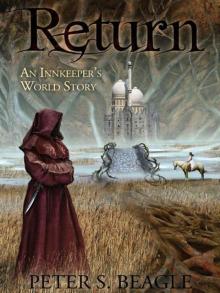 Return
Return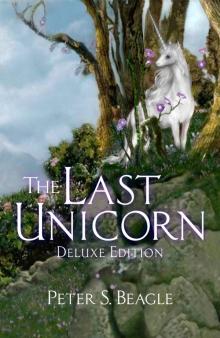 The Last Unicorn
The Last Unicorn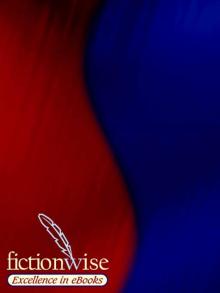 Two Hearts
Two Hearts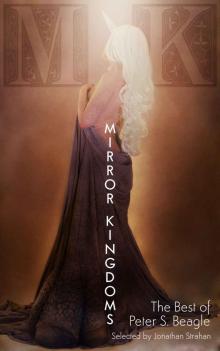 Mirror Kingdoms: The Best of Peter S. Beagle
Mirror Kingdoms: The Best of Peter S. Beagle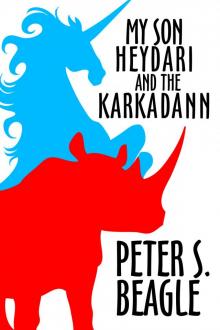 My Son Heydari and the Karkadann
My Son Heydari and the Karkadann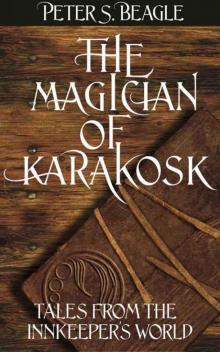 The Magician of Karakosk, and Other Stories
The Magician of Karakosk, and Other Stories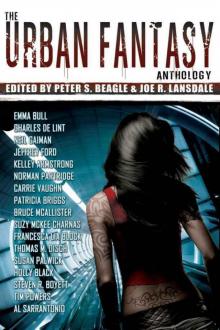 The Urban Fantasy Anthology
The Urban Fantasy Anthology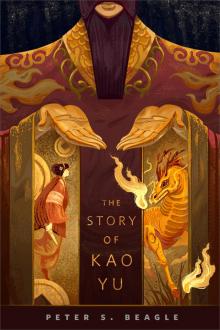 The Story of Kao Yu
The Story of Kao Yu The Karkadann Triangle
The Karkadann Triangle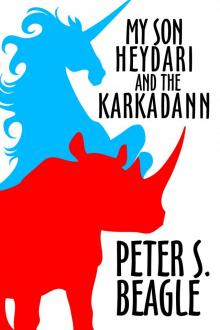 My Son and the Karkadann
My Son and the Karkadann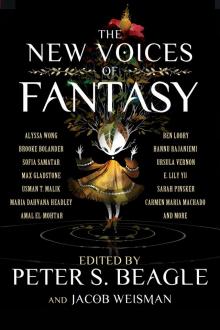 The New Voices of Fantasy
The New Voices of Fantasy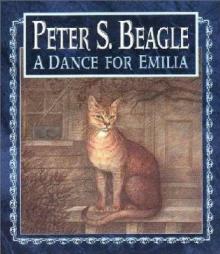 A Dance for Emilia
A Dance for Emilia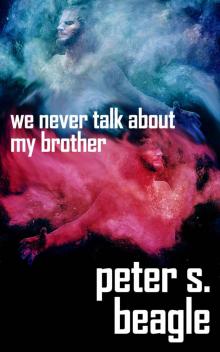 We Never Talk About My Brother
We Never Talk About My Brother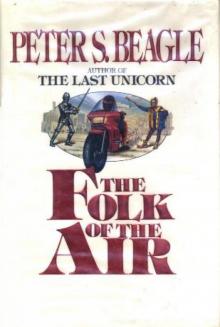 The Folk Of The Air
The Folk Of The Air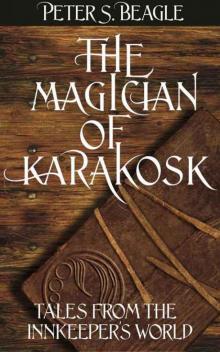 The Magician of Karakosk: Tales from the Innkeeper's World
The Magician of Karakosk: Tales from the Innkeeper's World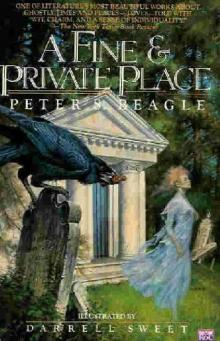 A Fine and Private Place
A Fine and Private Place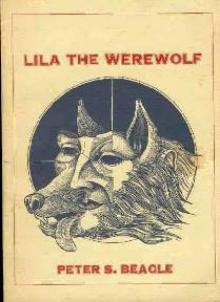 Lila The Werewolf
Lila The Werewolf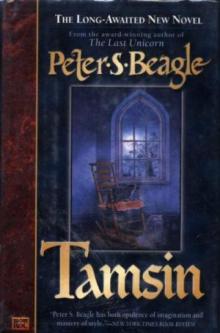 Tamsin
Tamsin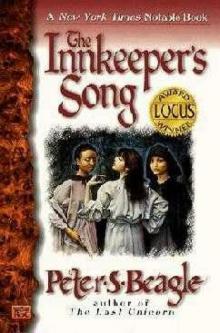 Innkeeper's Song
Innkeeper's Song